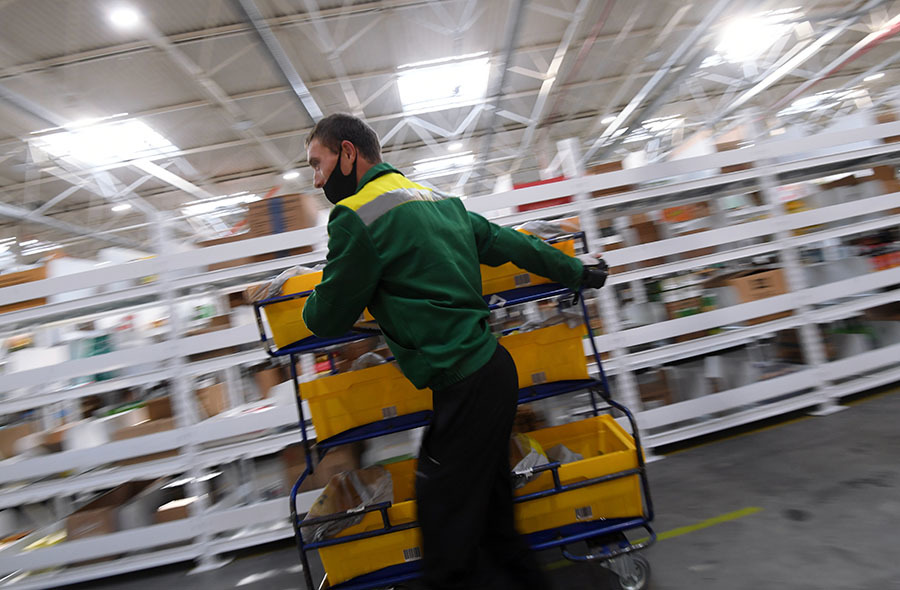From January to March 2021, the volume of online purchases in mass retail in Russia increased by 126% in monetary terms compared to the same indicator of 2020.
Such data were presented to RT by the specialists of the operator of fiscal data "Platform OFD".
The company processes 44 million checks daily from 1 million online cash desks in the country.
As noted in the organization, over the year the share of online sales in the total retail turnover in Russia increased from 5% to 10%.
At the same time, in April 2020, the indicator briefly rose to 23-25%.
“In absolute terms, online sales are now more than double what we saw before the pandemic.
Russians have become much more likely to buy food, electronic equipment, and repair and construction goods via the Internet, ”the company's press service told RT.
Analysts of the Cloudpayments service adhere to a similar assessment.
According to experts, from February 2020 to April 2021, the most noticeable increase in the online retail segment was the demand for food (sales increased by 273%), electronics and household appliances (87%), sports goods (85%), food delivery (28%) and educational services (21%).
“Online sales rose sharply at the very beginning of the pandemic, when, under the conditions of restrictions, online purchases with delivery became the only way for many to get even the most necessary, and education, against the background of mass remoteness,“ moved ”to online.
At the same time, people began to care more about their health, which explains the high demand for sports goods, "said Dmitry Spiridonov, CEO of CloudPayments, in an interview with RT.
It is noteworthy that even after the abolition of the main part of quarantine measures, the online trading market in Russia continued to grow, Spiridonov emphasized.
According to him, it has become more convenient for many Russians to buy goods on the Internet, and companies are trying to actively promote relevant services and services.
“Based on the results of all 2021, the same rapid growth in online trading as in 2020 will most likely not happen.
Nevertheless, sales of goods on the Internet may still increase by another 20-30% this year, "the specialist added.
An employee of an online store prepares orders for delivery to customers in Moscow
RIA News
© Kirill Kallinikov
In addition to the effect of the coronavirus pandemic, the growing popularity of non-cash payments is also playing in favor of the development of the Russian e-commerce market, experts interviewed by RT say.
According to the Central Bank, back in 2013, more than 86% of Russians paid for goods and services in cash.
In 2017, the share of using banknotes in retail turnover decreased to 52.6%, and in 2020 dropped below 30%.
At the same time, buyers increasingly prefer to pay for goods not only with bank cards, but also using smartphones.
Anastasia Uskova, CEO of the Fast River fintech platform, told RT about this.
“New ways of electronic payments, for example, through QR codes, are becoming more and more widespread.
Such transactions are cheaper for businesses than the classic card payment, which gives entrepreneurs the opportunity to make more generous cashback to customers.
For a consumer, this form of payment allows him to pay for the purchase, even if he has forgotten the card, ”Uskova said.
At the same time, food retailers in Russia began to develop networks of so-called micromarkets.
We are talking about special autonomous refrigerators, which are often installed in offices, and you can pay for purchases in them using the application, Gleb Kharitonov, CEO of Briskly, explained to RT.
“With the advent of the pandemic, more and more consumers want to shop without physical contact, even at offline points of sale.
In general, Russia is at the peak of development in everything related to mobile payments and new technologies.
Our people are more loyal to new products and quickly adapt to changes, ”added Kharitonov.
Against this background, completely autonomous stores without sellers may gain popularity in Russia, says Mikhail Kogan, head of the analytical research department at the Higher School of Financial Management.
According to him, already now large grocery chains are launching points with a minimum number of employees in the hall and without standard cash registers.
“All payments are made through cash registers, where barcodes of purchased products are punched through.
Workers are needed there only for laying out goods and maintaining order and cleanliness, "the specialist said in a conversation with RT.
Experts believe that further automation of retail and growth in online sales may have a positive effect on the Russian economy as a whole.
According to analysts, first of all, the filling of the country's budget can improve.
“The new model of consumer behavior guarantees the government an increase in taxation.
Electronic payments are easier to control, so businesses have fewer tax avoidance loopholes.
At the same time, automation of processes for entrepreneurs promises a significant reduction in operating costs and the wage bill, ”concluded Anastasia Uskova.

